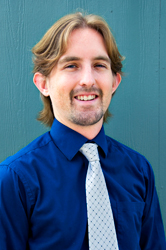The Hogg Foundation works to foster the capacity of individuals and organizations to engage in effective mental health advocacy. Through the Hogg Mental Health Policy Fellow Grants program, organizations receive grants to hire in-house policy fellows, individuals who receive extensive training and experience in mental health policy work.
In his own words, Clayton Travis, Mental Health Policy Fellow for
Texans Care for Children, tells us what his Hogg-funded fellowship has meant to him personally and professionally.
- Tell us a bit more about your background. How did you decide to get into mental health policy work? I’m a social worker by training and I’ve always been interested in working on the systems or policy level to impact vulnerable populations. It wasn’t until I was fortunate enough to take a graduate class with Dr. King Davis (previous Executive Director of the Hogg Foundation) that I became excited about health and mental health policy. We dove right into the 1000-page Affordable Care Act and dissected it piece by piece while also learning about the history of major policy shifts in mental health treatment in the United States. From there, I knew a fellowship that would allow me to take part in this historic time in mental health policy would be a great experience.
- What have you learned from working with legislators and their staffs at the Capitol? One major take-away would be the importance of customizing your message for an individual legislator or committee. For example, there are countless reasons why the state should expand its Medicaid program for all low-income individuals. Some legislators are persuaded by human stories, some by the economic benefits to the state, while others are motivated only by politics. It takes skill and persistence to appeal to enough people to make significant policy change.
- Personally, what did you accomplish this session that you are most proud of? There are so many bills to follow through the legislative session that it can be hard to be involved through every stage of the bill process, but with one bill I was able to do just that. It’s rewarding to know that a passed law is just a little bit better because of you helped to shape its language. I’m now following its implementation so that it can have the best impact for kids with severe emotional disturbances.
- The Capitol can be a physical and emotional grind. Did you find that to be the case, and if so, what helps you deal with it? I actually found the demanding pace during session to be invigorating. Being able to respond on the fly to legislative requests and testifying on two hours notice makes the work fun and even more rewarding when good bills get passed. I’m in a withdrawal of sorts now that I’m not spending most of my time under the pink dome. Or maybe I’m just not drinking as much coffee.
- What has been your favorite part of your fellowship at Texans Care for Children? Texans Care for Children is a great organization, and it has been a privilege to work and learn with some of the most talented advocates in the field. You can’t get this kind of support from staff and leadership everywhere. Our approach to crafting policy is equitable, strategic and thoughtful while always keeping the needs of children front and center.
- In what ways have you grown since you first started at Texans Care for Children? The most tangible way I’ve grown since starting at Texans Care for Children has been my understanding of the state’s complex health and human services system. There is so much baseline knowledge a policy advocate needs in order to be a part of the conversation and it really took a while before I could start speaking with confidence on the impacts of legislation on children with mental health concerns. In addition, I’ve grown to understand that even when I don’t completely understand a policy issue, I can still speak from a consumer values perspective. Raising questions can be just as important as having the answers.
- How do you plan on using what you learned during your fellowship in future work? I can really see myself staying in the consumer policy advocacy field. Being a voice at the Legislature for those who are underrepresented is rewarding and challenging and there is plenty of work still left to do in Texas. I know that my time as a Hogg fellow has opened numerous doors and will be an invaluable asset in my future career.

